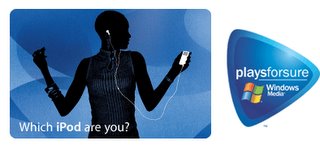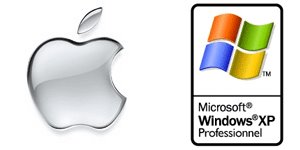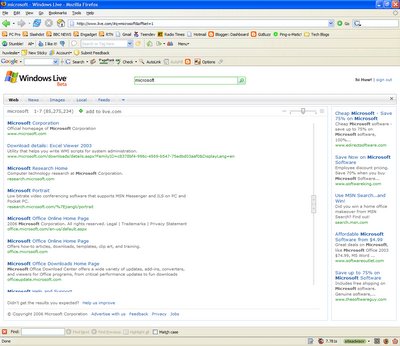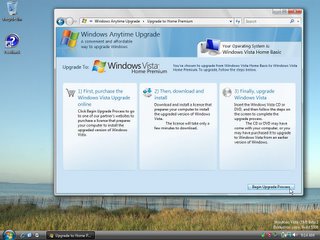One area that is thriving in the Web 2.0 boom is the area of web messenging. Two of the market leaders in this field at the moment offer very different angles on what is essentially the same service;
Meebo and
Mabber.

Meebo launched in alpha form on 14/09/05. It provides web access through an AJAX interface to AIM, ICQ, Yahoo! Messenger, Jabber/GTalk and MSN. An impressive list, and their registration feature enables you to consolidate all of these accounts into one, so with one login you have access to all your contacts, as well as the soon-to-be added feature of saving preferences.
Also impressive is the extremely slick AJAX interface.

It is highly intuitive, and behaves in much the same way as the real MSN. Each of the chat windows can be moved around the page as easily as with traditional programs. The sidebar (also moveable) contains all of the contacts online, and it is possible to chat to them by double-clicking. There is support for different statuses, and the necessary notification when the the person you are talking to is typing is also there. Above all, there is no noticeable lag from it being web based, and the AJAX functions perfectly to ensure that a page refresh is never necessary.
Meebo is in full public alpha, with no invitations or waiting lists.

Mabber is a similar service only in that it provides web-based messenging for its own Jabber network as well as MSN, AIM, ICQ and Yahoo!, the noticeable absence being GTalk. With Mabber an account is essential, and once you have signed in you are presented with a page with some options on (add messengers, leave feedback and other settings and help) and a messenger window.

The chat window shows the transports (for other networks) and the contacts online. When a contact is double clicked, another window opens for a conversation. The multiple windows open make for a less slick UI than Meebo, and also make it slightly slower, as it takes a perceptible amount of time for each page to load and render, rather than the instantaneous response of Meebo. There are also less options for formatting of chat text and no emoticons, a missing feature that could annoy many people. Chats themselves are fast, and the system does show a notification when the other person is typing. In short, the UI of Mabber is, whilst competent and largely functional, not on the scale of the jaw-droppingly smooth Meebo interface.
However, this is entirely excusable, due to Mabber's killer feature. The flagship feature of the product is the ability to use a Java application on just about any modern phone to connect to your contacts. I have installed and used the program, and it does work well and is well designed. At the moment its usefulness is limited as none of my friends have Mabber on their phones so I can only talk from phone to computer, but if the service catches on and everyone has Mabber on their phones I can forsee it becoming a useful replacement to SMS.
In conclusion, Meebo and Mabber are both useful services, and which one you choose depends on what you need. If you are not a 'mobile person' but would sometimes find it useful to use IM from a computer without a client installed or you want all your contacts and chats in one place, accessable from everywhere, then you should choose Meebo. However, if you would appreciate the ability to 'go mobile' and have the ability to chat from your phone easilly, as well as a web interface them Mabber is for you. Or you could use both! Both services will be very strong, and I have no doubt they will attract a strong userbase. They certainly deserve to.
*Mabber is currently invite only. I have 10 invites, so as usual comment below to recieve them!
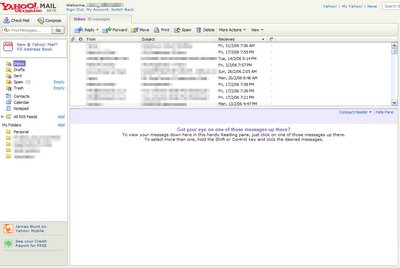 Yahoo have released a beta of their Yahoo Mail webmail interface to Yahoo Mail users, it asked me whether I wanted to try the beta when I signed in recently. It uses Ajax, meaning that the interface is very slick and doesn't need to reload the page to do most things. It looks like a response to Google's Gmail, which has led in the area of webmail interface usability for some time. It may also be a response to the Windows Live Mail Beta, Microsoft's up-and-coming version of Hotmail, which also uses an Ajax interface.
Yahoo have released a beta of their Yahoo Mail webmail interface to Yahoo Mail users, it asked me whether I wanted to try the beta when I signed in recently. It uses Ajax, meaning that the interface is very slick and doesn't need to reload the page to do most things. It looks like a response to Google's Gmail, which has led in the area of webmail interface usability for some time. It may also be a response to the Windows Live Mail Beta, Microsoft's up-and-coming version of Hotmail, which also uses an Ajax interface.





